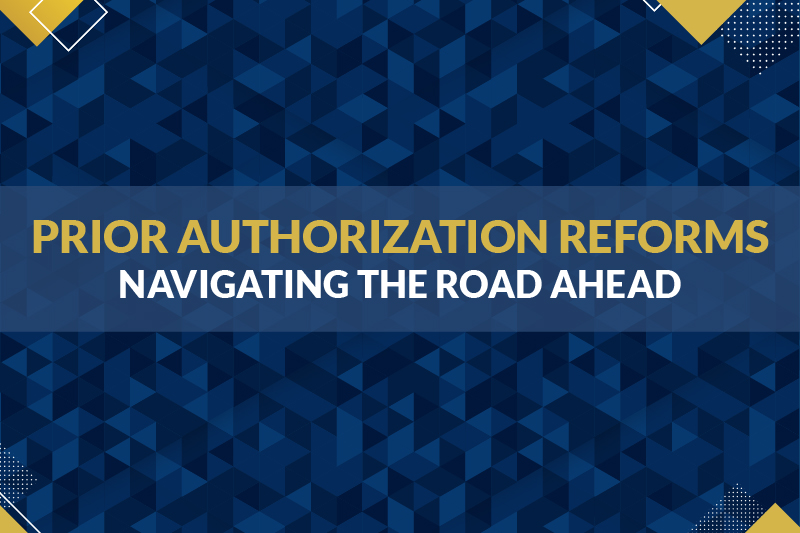Prior authorization has been a topic of contention ever since the strategy was proposed. While it certainly has benefits for healthcare payers, providers have been pressing CMS for reforms, and rightfully so.
Prior authorization is a process in healthcare where providers ask payers for permission to provide a prescribed procedure, service, or medication before they are given to the patient. The process is meant to make sure that what the provider is offering is necessary and that the procedures or services are covered by the payer.
This has posed quite a challenge for providers and the patients they serve. In this blog, we’re going to dive into the changes that CMS is proposing, withdrawing the December 2020 CMS Interoperability and Prior Authorization proposed rule, and how those changes will impact the future of healthcare.
Streamlining prior authorization processes.
Prior authorization is an important part of healthcare, but it can also be a burden for patients, providers, and payers. To make the process better, CMS has proposed a number of changes, including the requirement for payers and states to improve the electronic exchange of health data by 2026.
This will help everyone involved in the prior authorization process by giving them access to the information they need, when they need it.
One of the most important changes is the need for solutions that allow members and patients to access their own authorization records.
This will give patients more control over their own health information, and it will make it easier for providers to get the information they need to make decisions about care. Patients will be able to see exactly what information is being shared, and they will be able to update their own records if anything changes.
Another important part of the proposed reforms is the need for a provider-payer interface and a payer-payer interface. These will help ensure that information is easily shared between payers and providers, and that everyone has access to the same information, helping to reduce the burden on providers, who often have to navigate different systems and processes in order to get the information they need.
Building fast healthcare interoperability resources.
In an effort to improve the patient experience and make the prior authorization process more efficient and transparent, CMS is taking action to streamline the process.
Starting January 1, 2026, impacted payers will be required to build and maintain a Fast Healthcare Interoperability Resources (FHIR) API.
The FHIR API is an important tool in care delivery, as it will help to ensure electronic prior authorization. This will make it easier for patients to understand their payer’s prior authorization process and its impact on their care. The already established Patient Access API will be used to provide information about patients’ prior authorization decisions.
To ensure that patients are able to easily access their authorization records, payers will be required to report annual metrics to CMS about patient use of the Patient Access API. The goal of this policy is to make the prior authorization process more efficient and accessible for everyone involved, including patients, providers, and payers.
Challenges posed by interoperability.
The concept of interoperability is not a new one, but it has certainly become a hot topic in the health care industry. Interoperability refers to the ability of different systems, devices, and applications to work together seamlessly, sharing information and data as needed.
For the prior authorization reforms being proposed by CMS, interoperability poses a significant challenge. The requirement for payers and providers to improve the electronic exchange of health data, including the need for provider-payer and payer-payer interfaces, will require these systems to work together seamlessly. However, finding a simple solution for interoperability is no small feat.
The challenge posed by interoperability is significant because it has the potential to impact the patient experience and care delivery. If the prior authorization reforms cannot be implemented in a way that effectively addresses the challenges of interoperability, it could result in care being delayed and patients unnecessarily paying out-of-pocket or abandoning treatment altogether.
In light of these challenges, it is important for CMS and other stakeholders to continue to focus on finding practical and effective solutions for interoperability in the health care industry.
Advancing interoperability.
Prior authorization reforms are a crucial aspect of the health care industry. The process of prior authorization is necessary to ensure that medical items and services are covered by the payer and medically necessary, but it can also create a burden for patients, providers, and payers.
CMS is taking steps to alleviate some of these challenges by proposing a number of policies to improve the efficiency and transparency of the prior authorization process.
These proposals include the requirement for payers and states to improve the electronic exchange of health data, the implementation of solutions for members/patients to access their authorization records, and the creation of provider-payer and payer-payer interfaces.
Additionally, starting in 2026, payers will be required to build and maintain a Fast Healthcare Interoperability Resources API to ensure electronic prior authorization.
However, despite these proposals, the challenge of interoperability in prior authorization reforms remains a significant concern. Interoperability is a hot topic and one that is difficult to solve simply. The proposed policies are a step forward in care delivery, but they may also pose a significant burden for payers and providers who already struggle with interoperability.
Nevertheless, CMS’s proposals for prior authorization reforms are a step in the right direction, and they will ultimately help to improve the patient experience.



